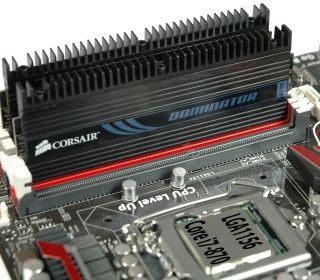LGA 1156 Memory Performance: What Speed DDR3 Should You Buy?

Which Memory Speed Do You Want?
Intel’s mainstream LGA 1156 interface hosts the Core i5 and Core i7-800 series, plus the Core i3 soon expected to cover lower price points. It’s possible to run DDR3 memory on the platform at speeds between DDR3-800 and DDR3-2000—or even faster if overclocked. From prior analysis of Socket AM3-, LGA 775-, and LGA 1366-based platforms, we know that faster RAM is favorable in overclocking scenarios, but it doesn’t provide additional performance. This time we looked at a Core i7-860 system and cross-tested various popular memory speeds and timings.

Memory: The Market
The memory market is dominated by several competing manufacturers that all focus on brand recognition. Memory companies without such brand sensitivity—meaning large OEMs business like Micron or Samsung—typically have to be more aggressive in releasing high-end and enthusiast products that will attract attention and highlight their product as a preferable choice.
There are definitely quality differences in memory. Top-shelf memory (products from the likes of A-Data, Buffalo, Corsair, Crucial, G.Skill, Kingston, Mushkin, OCZ, Patriot, Super Talent) depends on using high-quality parts and having modules undergo extensive validation and testing. Different memory IC series' have varying characteristics, as well.
The better a vendor’s reputation, the more likely it is for different products to sell well. This means that memory vendors must be quick with releasing top-end products to make sure that they constantly remain in the news. Whether or not these products are actually top sellers is a different story.
A Bigger Question
Because there is a significant cost difference between mainstream memory products at average speeds/timings and performance parts, we have to ask the old question again: which memory should you buy for Core i7? Only now, because we’re looking at the LGA 1156 platform (with its two channels and more mainstream pinning), the question is broader. The answer we find will likely affect systems spread across the Core i7-800 series, Core i5-700, and the upcoming Core i3 entry-level processor families.
Stay on the Cutting Edge
Join the experts who read Tom's Hardware for the inside track on enthusiast PC tech news — and have for over 25 years. We'll send breaking news and in-depth reviews of CPUs, GPUs, AI, maker hardware and more straight to your inbox.
Current page: Which Memory Speed Do You Want?
Next Page Speeds: DDR3-800 And -1066Most Popular

